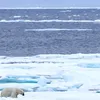Polarstern team warns Arctic may be past tipping point
A research team that set sail for the Arctic has warned that the tipping point for irreversible global warming may have already been triggered.
The scientist who led the international MOSAiC expedition to the North Pole recently warned that the point could have already been reached at which irreversible global warming is triggered.
During its expedition, the German research vessel "Polarstern" drifted through the Arctic on an ice floe for a year to also be able to research the winter at the North Pole and the effects of climate change.
What did the research team find?
"The disappearance of summer sea ice in the Arctic is one of the first landmines in this minefield, one of the tipping points that we set off first when we push warming too far," said team leader Markus Rex, adding, "One can essentially ask if we haven't already stepped on this mine and already set off the beginning of the explosion."
Rex led what was the world's biggest mission so far to the North Pole — an expedition that involved some 300 scientists from 20 countries. Its Polarstern vessel returned to Germany in October bringing evidence of an Arctic Ocean that could see ice-free summers within decades.

Presenting the information eight months on, Rex noted that the ice had retreated "faster in the spring of 2020 than since the beginning of records" and that "the spread of the sea ice in the summer was only half as large as decades ago."
"Only the evaluation in the next years will allow us to determine if we can still save the year-round Arctic sea ice through forceful climate protection or whether we have already passed this important tipping point in the climate system," he said.
The team collected huge amounts of data aimed at building a better knowledge of the climate-relevant environmental processes at the North Pole.
The €140 million ($165 million) expedition returned with an estimated 150 terabytes of data and more than 1,000 ice samples.
(This article was originally published on Deutsche Welle.)
Edited by Suman Singh







